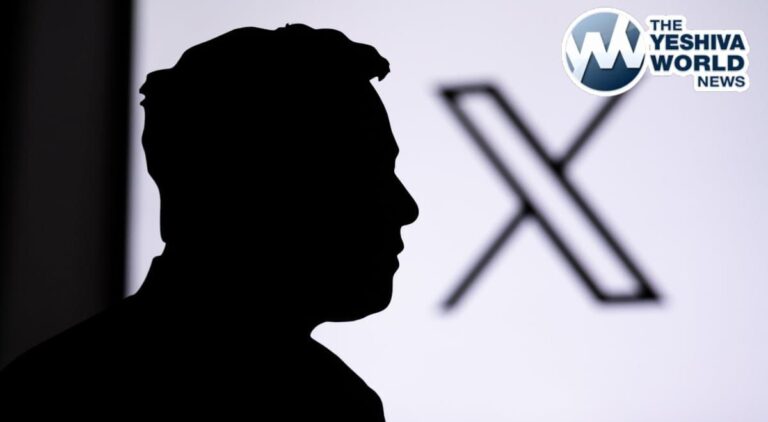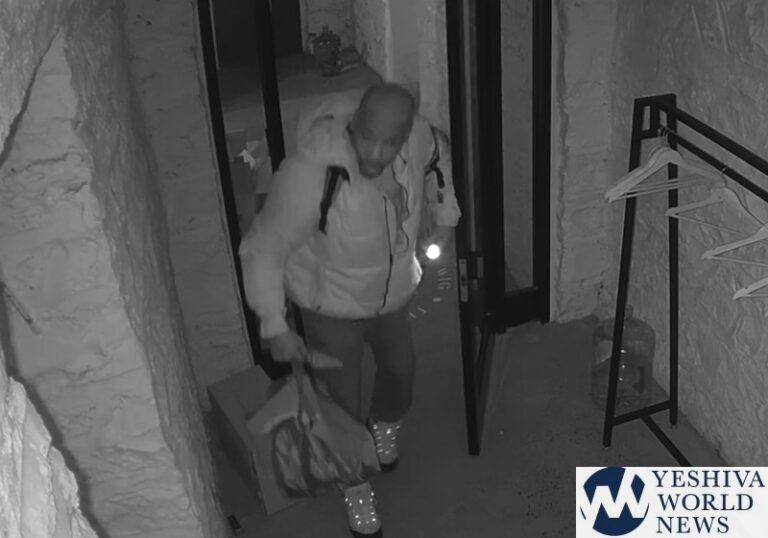 By Rabbi Pinchos Lipschutz: In Jewish homes around the world, Pesach is in the air. Houses are being turned upside down. Every drawer is emptied and its contents scrutinized; books are inspected to make sure no one hid any crumbs in them. Pockets are being turned inside out and brushed meticulously clean.
By Rabbi Pinchos Lipschutz: In Jewish homes around the world, Pesach is in the air. Houses are being turned upside down. Every drawer is emptied and its contents scrutinized; books are inspected to make sure no one hid any crumbs in them. Pockets are being turned inside out and brushed meticulously clean.
You walk into any Jewish store and you just feel the approaching Yom Tov as shoppers rush through the aisles, stocking up on just about everything.
Boys are trooping home from yeshiva for bein hazemanim. Small children are learning the Haggadah, practicing the mah nishtanah, and dreaming about what they will get if they are lucky enough to find the afikoman.
This is the way our people have celebrated the zeman chairuseinu for hundreds of years. In fact, much of special charm and essence of Pesach is wrapped within the minhagim passed on from one generation to the next, and the hiddur mitzvah that characterizes this Yom Tov.
Jewish women hold onto these hiddurim with all their might. They treat Pesach with exquisite care. They brush aside their husbands’ patient explanations that crumbs are peirurin, are halachically botul and not much of a problem. They don’t want to be told that makom she’ain machnisin bo chometz, a place where chometz does not enter, does not require cleaning, like the kitchen table and refrigerator.
People wash down their walls and scrub everything in sight because that’s the way their mothers did it. Not only are recipes handed down from generation to generation, but so are the various customs of what to buy, how to buy it and how to prepare it for the special chag of Pesach.
Why do some people eat horseradish for maror? Because their fathers and their grandfathers and great-grandfathers ate chrein to fulfill the obligation of eating “bitter herbs.” How do you set up the ka’arah? The same way your father did.
Judaism is based not only on the dry halacha, but on the customs and minhagim which are passed on down through the ages. Our mesorah and traditions are as important as the laws stated in Shulchan Aruch, the Code of Jewish Law, and together they constitute the strength and lifeblood of our people.
We won’t be swept up by new ideologies or fall prey to those who preach doom and gloom. We won’t look for movements with failed or failing messages. Haskala, Zionism, communism, socialism, assimilationism and many other isms rose and fell; they held no attraction for us. We refuse to trade in our sacred heritage for the illusion of safety and for the fleeting attraction of utopian movements.
Several years ago, I wrote a column based on a story I read in the “Rav Shach Hagaddah.”
One year prior to Pesach, a young man came to ask Rav Shach if it was permissible to do bedikas chometz with a flashlight. Responding, Rav Shach asked him how his father conducts the search for chometz. The man answered that his father did it with a candle.
The aged rosh yeshiva said to him, “If your father does bedikas chometz with a candle, why would you think to do it with a flashlight?”
The young man replied that people say that with a flashlight one is able to examine cracks and crevices better than with the traditional candle.
With a wave of his hand, Rav Shach peered at him quizzically and said, “Do you really think you can see better than your father!”
This episode underscores the secret of our existence and survival through the ages. We hold on to the wisdom of our parents and sages; we don’t presume to be smarter or that we can see better than they were able to see.
We observe the mitzvos the same way they did. We do bedikas chometz in our homes the same way they did. Our homes may be grander, they may be furnished differently than the shtetel’s humble abodes, but we are connected to our source by that same little candle with which we go about from room to room, searching to remove that which is forbidden.
We adapt by meeting the challenges of today with our father’s candle of the past; we adapt by following our sages’ advice; we adapt by looking at life through our parents’ lenses and aligning our vision with theirs. That way we are guaranteed to properly observe the Torah and its commandments and avoid evil’s pitfalls.
True, we live in a different age, a different world. We are living in a society that has undergone drastic changes from the society our fathers knew, but it is the same ner nitzvah and ohr Torah which light up our path.
An incident last week brought to the world’s attention – albeit in a twisted light – the historic devotion of Jews to their traditions and their separateness as a people.
Historians from Cambridge University revealed a previously unpublished article by the former prime minister of England, Winston Churchill, in which he makes the argument that Jews were “partly responsible for the antagonism from which they suffer.”
In analyzing the causes of anti-Semitism, Churchill writes: “The central fact which dominates the relations of Jew and non-Jew is that the Jew is ‘different’.
“He looks different. He thinks differently. He has a different tradition and background. He refuses to be absorbed.”
A contemporary Torah Jew reading his words can only shake his head wistfully at the irony. Churchill accurately identified the defining traits of Jews throughout the ages, but he failed to understand that, rather than leading to our downfall, these stubborn differences – the refusal “to be absorbed” – have preserved the Jewish people through centuries of persecution.
Brilliant statesman though he was, Churchill stumbled when it came to understanding Jews and their mission.
A recent Yated article titled “Is It Orthodox?”, which raised the alarm regarding the threat posed by Yeshivat Chovevei Torah, elicited a voluminous response from readers, some of which reminded us of Churchill’s failure to grasp the essence of Jewish survival.
Words of support and encouragement for our position flowed from a wide spectrum of readers. The response from the YCT camp and their supporters, however, made it clear that they appeared to totally misconstrue the basic premise underlying our opposition.
That premise – both the foundation and a powerfully protective guard to Yiddishkeit – can be summed up in a word: mesorah.
Mesorah is meant here not merely as the transmission of texts from one generation of teachers to the next, replaceable by a capacious hard-drive. Rather, mesorah refers to the contextual basis for understanding the words of Chazal. Mesorah refers to the process by which uniquely Jewish mores, values and sensitivities, which define us as a nation, are passed down from one generation to the next.
Only through mesorah can we grasp the unalterable elements of a true and timeless Torah philosophy.
The article presented examples in the teaching and practices which are departures from mesorah. It showed how a student of Torah at that school, sundered from his moorings to traditional Torah thought, is left in his studies to bob on a sea of “Torah-Relativism.” In that nebulous terrain, he is buffeted by the waves of other theologies, swept by the winds of value systems anathema to Torah.
It is our conviction that the rank and file of contemporary Orthodox Jewry – Modern, Chareidi and everything in between – still possess authentic Torah sensibilities which are repulsed by the erasing of historic conceptual boundaries on the part of YCT faculty and students.
Torah values are not acquired through academic study alone, but through immersion in the atmosphere that once permeated every frum home. They are absorbed from studying at the feet of rabbeim who themselves personify fealty to traditional values. And it is this value system which is eroded by the philosophy of YCT as previously illustrated in these pages.
A pair of responses to the Yated article has been circulated on the internet. Sadly, rather than address the concerns that were raised, these “rebuttals” serve only as further illustration of the failure of this new approach to learning Torah. Having burnt their bridges to traditional Torah thought and values, the authors prove themselves incapable of grasping the simple nature of our objections.
As an example: We expressed repugnance at the portrayal of one of the Avos that dragged the patriarch of the Jewish people down to a base level. What to us is an act of desecration is dismissed in their response as a mere stylistic lapse. We are asked to accept a portrayal of impure motives that, were it ascribed to the author’s teachers at YCT, would be slammed as cynical and offensive. Yet, this twisted portrayal is given a pass as “poetic license” when applied to Yaakov Avinu.
We lamented the state of affairs in which a yeshiva allows the publication, under its official imprimatur, of statements that are clearly contrary to the Torah. In response, we are told that due to “a whole panoply of issues,” this travesty must be tolerated.
When a yeshiva shirks its primary responsibility for guiding its students and graduates in the ways of the Torah and still persists in calling itself a yeshiva, it makes a mockery of a term which denotes a sacred link to the historic system of Torah learning and transmission begun at Volozhin. Such an institution perverts the meaning of “yeshiva.” It redefines it to mean a free-wheeling bazaar of ideas and practices culled from various theologies and cultures.
In our critique, we pointed out the deceptive practice of labeling deviations from accepted halacha as Orthodox. We were told in response of this or that Orthodox rabbi or professor who also deviates in the same way. How do these deviations confer legitimacy? Are we really expected to accept an amorphous definition of Orthodoxy that does not even attempt to tie itself to any defining authority, but which accepts the practices of anyone calling themselves Orthodox as determining what passes for normative Orthodoxy?
We are told that we are mean-spirited and “lacking in ahavat Yisrael.” Actually, it is our compassion for the hapless targets of this approach who are being fed a forged version of Torah and halacha which motivates us. It is our concern for the integrity of Torah learning which drives us to publicly reject their approach. And we are deeply troubled that fellow compassionate, hard-working and dedicated Jews are being trained in a fashion that denies them the ability to appreciate true Torah values.
Ahavas Yisroel does not require turning a blind eye to the blurring of mesorah and the sacred values that have traveled down the centuries. Our trailblazing kiruv programs testify to our solidarity with our Jewish brothers and sisters. But we trod the path laid out by rabbonim muvhakim and our bubbes and zaydes. We dare not compromise our values in the name of kiruv rechokim. We must not portray a dishonest version of the Torah in order to be more attractive to the world at large.
We must not sit silently in the name of peace when a mockery is made of divrei Chazal. It is precisely by remaining true to our mesorah, and by our intolerance of ziyufim, that we will be zoche to the siyata diShmaya to succeed in spreading the light of the Torah, intact and unsullied by winds of change.
So, erev Pesach, when you stand there grating the horseradish and tears flow down your cheeks, think of your grandparents performing the same function, the same way, in some little town in Lithuania, Poland, Hungary or Syria. On Sunday night, when you go from room to room with the candle in your hand, remember that living in the 21st century has not made you smarter than the generations that preceded you. It is presumptuous and naïve for anyone to try to modernize and improve upon the mesorah.
Think of the strength of the Jewish chain and remember that it is you who makes it strong. It is the faith-imbued traditions that you pass on to your children which will guarantee you the merit to welcome Eliyahu Hanavi when he arrives with his joyous, long-awaited message: higiah zeman geulaschem.











41 Responses
Allow me to disagree with what seems to be a major part of the theme of this message as I understand it: “Our customs as passed down for generations are perfect and beyond reproach. No improvement is necessary or desirable.”
I disagree because there are numerous minhagim that are mentioned in halacha that are “wrong”. So just because people do it doesn’t make it right. This is particularly so with regard to minhagim that go against clear halachah, v’eain kan mokom le’ha’rich ve’hamayvin yavin.
I have only the greatest respect for Rav Shach zt”l. However
specifically regarding the story about bedikas chometz, Rav Moshe Feinstein zt”l has paskened, that it is indeed better to do bedikas chametz with a flashlight. (If anyone challanges this, I am sure I can dig up the source.)
In general we are a community that adapts modern technology to enhance our shmiras hamitzvos, and the flashlight is only the smallest example. I know of no Rosh Yeshiva who insists on giving a shiur without a microphone, even though his father never used one. Go into your wife’s kitchen and you will find many items used to enhance shmiras Shabbos v’Yom Tov that your grandmother never used.
I am really puzzeled by that story about the flashlight, and I suspect that there are other issues that were involved in that particular story.
Anyway, a psak given to someone in Benei Brak, may be totally inapropriate to someone in New York. I can think of some good reasons why that might apply in this case.
esg78 – I think you missed the point. The point was not about minhagim specifically, rather about the importance of mesorah. Our steadfast adherance to minhagim is only one example of that.
The point of the story from R’ Shach was not to bring out a halachic discussion, as you are trying to do, it was just demonstrating how the importance of mesorah. A flashlight might be better according to some (BTW R’ Elyashiv and others hold it is not good, because of the glass in front of the bulb, but that is a side issue), but if the halacha says to use a candle and your father used a candle, why try to one up our mesorah. That was the point.
What exactly do the appliances in our kitchens have to with anything?
Kudos to R’ Pinny. Well said as always.
esg78 YOU MISSED THE BOAT. The story about Harav Shach was not meant to bring out a halachic ruling. Harav Shach did not adress the issue if it is permited to use a flashlight or not. He was just making a point that we are not better then the previous generations.
I’m sure if the question was asked to Harav Shach ZT”L differently, he would have given a deffernt answer. If the questioner would have asked if he can use a flashlight because it is easier and more convenient and safe, maybe Harav Shach would have told him it was O.K..
But he told Harav Shach he wanted to use a flashlight because he could do a better and more mehudar bedikah. He could see the cracks and crevices better.
This is why Harav Shach answered him in this manner. Our previous generations knew more than us and were saturated with Yiras Shomayim. If Chazal told us that using a candle at night was a good enough tool to use for the bedika, and this was enough to let us see the cracks and crevices, then we should not try to outsmart Chazal. This is the way our fathers and father’s fathers have been doing bedika since the time of Chazal.
If there is a convenience or safety issue, that is a completely different question. We have more cluttered homes which can catch fire easily. This is a halachick question. Harav Shach was adressing a Hashkafik question!!
So the comments begin exactly where the Yated says that they went before. Nitpicking on a detail of the ma’aseh, and individual points, but not adressing the larger issue of not being meshane major things like the hashkafa of avoseinu hakedoshim.
And our grandmothers lived in one room houses so they had plenty of time to wash the walls and ceilings. They also weren’t working a full time besides the full time job of taking care of the kids. Believe me, the Pesach hotel operators love all these chumros. They just make people give up, lock up their houses and go to a hotel.
esq78
Rav Shach Ztzl was addressing this point explicitly. He was trying to point out to the person asking the question that some introspection is required of him. You are coming to ask ME (meaning Rav Shach Ztzl) this question about a flashlight. Be aware that the Torah was not given recently, here in Bnei Brak.
midwesterner, you’re missingthe point of esg78’s comments.
Yes, we all trully cherish our minhagim of generations past, btu there is a vast differnace between a minhag and what was simply ‘the way it was done’. A minhag is based in Torah, chosing a way to do someting based on 2 (or more) opinions from Rishonim and Achronim.
“Doing it the way we did it in Europe” is simply being blind to Halacha dn not adjusting with tech/logistics/practicality, and yes, even Halacha. There are many ‘Mihagim’ that have no basis in Torah but are followed as Moshe M’Sinai, by parts of teh community and Pesachis wear many of them pop up.
We are in no way looking to give-up on customs of generations past, but there is also no need to live in the past.
A Chag Kasher V’Samach….May Your Matzo Be Crunchy. (Well, unless your Sephradi and eat soft Matzo)
Its bad enough that we have to read a frustrated balabus as editor of his views paper. do we have to put his stuff here!!!!!!!!!!!!!!!
I unfortunately know of a little boy who would be alive today if his father had checked under the bed with a flashlight.
It was interesting to read all the comments. ChaimYankel, yosher koi’ach. I think you got my point exactly. This is an overarching hashkafah issue, many examples abound. While the candle vs. flashlight may be a matter of halachic dispute (as one post stated) the way Rabbi PL used it in the story and thereby denigrating the fact that many of us may intentionally use a flashlight and consider it a hiddur, I found offensive. That is what prompted my original post.
chinuch Says:
March 20th, 2007 at 3:26 pm
Its bad enough that we have to read a frustrated balabus as editor of his views paper. do we have to put his stuff here!!!!!!!!!!!!!!!
All “news” papers have an editorial slant, Pini is a bit more open about it, that does not:
a) make his paper worthless, (that is unless you don’t agree with his point of view.
b)make him a lousy writer, this is a fine provocative article
BTW, people who use many exclamation marks, seem frustrated.
how do you know that he would be alive today? harbe shluchim lamokom
esg78:
What did you mean when you stated “because there are numerous minhagim that are mentioned in halacha that are wrong’”. do you mean to say that there are certain minhagim that people have, and the notable Halachic works maket us aware of the “wrongness” of these minhagim. Or was it an implication that some minhagim, which are cited in halacha as a directive are ….
I would appreciate your clarification in order to know how you go about defining right and wrong.
Chaim Yankel:
I (for all the diference it makes) like your point. However, does it adress the point of the article?
Mr. chinuch:
Hey hey hey, please clarify to us why we need YOUR views here!?
Chinuch –
You do not have to read ‘a frustrated balabus as editor of his views paper’.
Just don’t buy the paper!!!
y.k. –
My comments were directed at midwesterner’s understanding of esg78’s post.
borninthebronx-
does his last name start with a f?
Why is it ‘presumptuos and naive to try to modernize on the mesorah’? (in other words: why can’t I use a food processor for my maror and store it in an airtight container so that it doesn’t lose its bitterness lie it did in the times of the Shulchan Aruch?)
We are not Amish.
In the times of Moshe Rabeinu, did they have a printing press and a newspaper of Torah Values that belonged in OUR home?
y.k.
My grammar was not precise. There are numerous minhagim in existence, or were once upon a time, that halachic authorities, down through the ages, have pointed out to be erroneous or just completely bad practice, and should be stopped.
Dear Justanybody, YES, I am frustrated!!!!!!!!!!!!!!!! Hey, I learn the Daf every day on the internet, using dafyomi.org. Just because in the past we only had paper Gemorrahs should that make be obstain from using the internet to learn the daf? Of course not, because there is no “minhag” per se to learn out of a Sefer only.
The question here is not whether we can use technology to further our adherence to Torah, Mitzvos, and Ruchnius – everyone agrees that we can!!!!!!!!!! (frustrated). But Minhagim that are deeply rooted in our Mesorah should be treated as Halacha – Minhag Yisroel Din Hu – and never every be modified in any way by technology. They should be treated as things that CANNOT be improved by technology, and we should treat them as Halacha MiSinai. Does anyone know whether there is a truly much deeper point to using a simple candle that just shedding light?!!! (Maybe we should light Shabbos candles using flashlights too, just to be safer)!!! Frustrated.
Rav Shimon Schwab zt”l paskened that using a flashlight is preferable over a candle – especially in places where one might not check as well with a candle, such as clothing closets and clothing drawers (afraid of fire, or of dripping wax). But, he said that one should start the Bedika with a candle so as not to completely ignore the original minhag.
It seems that every year, we read about someone, somewhere, who is killed, severely burnt or homeless from a fire ignited from a candle used for bedikas chometz. I certainly hope that it doesn’t happen this year, but who would bet on it?
My personal preferred method: Duct tape a flashlight to a portable Dustbuster vacuum cleaner.
The danger of fire in close quarters is significant, surely one of the reasons why several poskim have gone on record as preferring a flashlight. I don’t know how anyone can properly do a bedika in a clothes-filled walk-in closet using a candle. But maybe I’m just not competent.
naye kuk Says:
March 20th, 2007 at 6:20 pm
how do you know that he would be alive today? harbe shluchim lamokom
I love these pious sounding statements. Are you saying that a person does not have a responsiblity to be as careful as possible in order to avoid accidents?
Expatriate Owl,
In everything we do there is some inherent risk. Every day we hear of people being hit, RM”L, by cars. Should we therefore Assur walking in the street? We hear quite often of accidents while cooking, RM”L. Should we therefore Assur having kitchens, and make everyone order everything from the local takeout? We hear quite often of accidents with Channuka Licht. Should we therefore Assur using candles and use electrical Menorahs instead? The answer is not to change a dear and true Minhag or Halacha because there is some risk. The answer is to increase awareness of this risk, educate the public, and then hope that people act responsibly.
I’m sorry to say, but your flashlight/dustbuster/ducttape solution sounds nauseating!
Eliezer,
As one of the commenters asked before, what is the mekor to call using a candle a minhag as opposed to what else were they supposed to use back then? There wasn’t anything else around! Do you call using modern baking ovens changing the minhag also? Maybe we should use old fashioned ovens built out of earthenware using wood as fuel.
dave375,
I thought that was the whole point of Rav PL relating the story with Rav Shach, Zatzal. We can clearly see from Rav Shach’s response that using a candle in particular for Bedikas Chometz is more than just a matter of “that’s what they had back then,” but rather there seems to be a more deeply rooted Mesorah in using a candle as opposed to something else. As you correctly state, and as I stated before, using or not using a modern baking oven is a senseless discussion as there is no Minhag or Halachik Mesorah about it. But Rav Shach’s response very clearly depicts that there is a Minhag/Mesorah in using a candle.
Eliezer,
I saw the story also. I’m just asking a question if there’s something kabastic about it or what.
I as well only have the greatest respect for Rav Schach ztl and suspect as someone said above that there were other circumstances in the case of the flashlight. I for one use a flashlight and there is no question that you can see better and safer with it. The Torah is a guideline for the genrations but it is also living not dead lo aleinu. We can adapt to the times as long as it conforms to halacha. Searching with a candle is nice but dangerous. If you want to do it becuas eof custom light it and leave it on your dining room table until you are done…In either case I think the point is being missed that the BIGGER picture is the issue. The issue is biur hametz bc the torah says to get rid of chametz. Details are important but not if they are unsafe.
I heartily disagree with you, ac123, and I think you have hit on the core of this discusion.
When you state, “we can adapt to the times as long as it conforms to halacha” the question remains, who determines what is Halacha? If we take the words of the Gemorah, “Bodkim Es Hachametz L’Ohr Haner” at face value without Lomdisha genius, and we take Rav Schach’s advise at face value without trying to twist this simple story into more than it is, then using a candle IS HALACHA, or Halacha via minhag, because Minhag Yisroel Din Hu.
If your grandfather and great-grandfather – both who had access to flashlights – still used candles to do B’dikas Chometz, then that is your Minhag, and therefore it is your Halacha.
Using a candle to me is not just a nice warm axiom, said to make us feel all good inside. We don’t put the candle on the dining room table and leave it there like some romantic dinner ornament – it is a statement of fact, our Minhagim become our Halacha. It is not, as you say, “Searching with a candle is nice…” It’s not nice. We don’t do it because it’s nice, or heartwarming, we do it because it is our Mesorah.
The issue is NOT, as you say, Biur Chametz, but rather SEARCHING FOR CHOMETZ WITH A CANDLE. That is the mitzvah, the searching – just as searching our souls for Avairos is a mitzvah, and not just the rooting out of the Avairos. These are not “details” as you refer to them, they are our life and breath.
No one is denying the fact that you can see better with a flashlight. (I would also hear my Rov’s Shabbos Drasha better if he would only use a microphone on Shabbos – but that would not conform to Halacha.)
But, again, there are certainly Poskim who say that a flashlight is preferable, and I humbly bow to their wisdom for their talmidim.
I, however, do not need to ask a Shaila. I will continue to do as my father, grandfather, great-father, father-in-law, grandfather-in-law, and great-grandfather-in-law have done, even though flashlights were available. I’ll use my little candle. 🙂
Funny, I attended a women’s shiur on how to clean for Pesach and the rav who was delivering the shiur brought his wife along. Before every halacha that he clarified(told the women they don’t have to do as much, or work as hard as they always do because it wouldn’t rid the house of anymore problematic chametz) he prefaced the halachah by saying, “although my wife does so anyway, according to halachah, you don’t have to do such and such!” Women, Ah!
Eliezer,
did you show vort to a Rav to get his opionion on what you are saying is correct-that the candle may have a din of Halacha, or is that your own feeling?
Dave,
I may be wrong about this, but I don’t feel the need to ask a Shailah when it’s been done with a candle for generation after generation. I only ask a Shailah when I’m unsure about something. This is not one of them.
>Why is it ‘presumptuos and naive to try to modernize on the mesorah’? (in other words: why can’t I use a food processor for my maror and store it in an airtight container so that it doesn’t lose its bitterness lie it did in the times of the Shulchan Aruch?)
>We are not Amish.
Perhaps because trying to preserve the sharpness of the horseradish is not a hiddur, but a sakkanah? For example, R. Moshe Shternbuch (Tshuvos V-hanhagos II pg. 238) says that one should davka leave it uncovered for a few hours so that it loses most (but not all!) of its potency.
That said I certainly agree with your point about technology.
Eliezer, I’m proud of your techno savieness, and adaptation of modern products for good use.
Please relax, it is OK to be frustrated, my point was ,your (or Mr chinuch’s) frustration is not really a basis for a intelligent conversation. Also he was complaining about Pini Lipshitz being a “frustrated bal’abous”, my reply to him was, your use of “!!!!!!!!!!” indicates that you are frustrated, and therefore it is not fare to be upset at another person’s use of his frustrations for a positive and productive occupation, which Pinny Lipsihtz, love him or not, is doing. Sorry for the long run on sentance, I guess I must be frustrated.
However I am not convinced that Pini is frustrated, I actually think he is relatively at peace with who he is and what he does.
Also, the term “bal’abous” being used in the negative connotation of Mr Chinuch, was absurd, I think, and should be examined further by other frustrated people such as you, Eliezer, myself, and other great minds in the blogging stratosphere.
So open up my friends, tell me are you perhaps a “bal’abous”, and frustrated that you are one?
Can one be a “bal’abous”, and still have daas torah, is that a mefurashe steera?
Dachtzach the Chayei Adam, the Rashash, and many other popular mechabrei sepharim were balabouses, perhaps these sefarim were products of their frustrations?
MainLine,
Rav Mosh Feinstein was also noheig as you mentioned. However, the Mishna Berurah in 504:1 says to leave it covered until the seder. (Kol Dodi)
Lihagdil Torah ul’haadirah
Eliezer,
I’m not asking you to ask a shaila if you should use a candle or not. I’m questioning your vort that the candle has a din of a halachah.
Dave,
In my humble little mind, there is no question at all that the Halacha is to do B’Dikas Chometz L’ohr Haneir, which means a candle. Just like Nier Shabbos and Neir Channuka are only with a candle and not electrical lights, why should this be any different? Who are we to decide that a flashlight can be sustituted for or is better than a candle? The Sifrei Halcha only mention a Neir, and never mention a flashlight – except for the more modern day Halacha Seforim.
That’s the best I can tell you.
Well, that’s what a chavrusah or a Rebbe is there for. To get different opinions and make you prove your point. And if you really believe that your mind is humble as opposed to just a figure of speech, you wouldn’t be afraid to get other people’s views on this. Just my humble opinion 🙂
Eliezer, obviously you have done alot of research.
The gemara in Pesachim questions why we use a ner and not a avuka (torch). Certainly the torch would enable us to see better! The gemara answers that if one used a torch then he would refrain from checking the small holes and cracks that chometz could be in for fear of starting a fire. Therefore, he should use the controllable flame of a candle. Note that the gemara does not say that the reason it is a candle is because there is a gezera shava to Ner Shabbos or Ner Chanukah. Where did you get such an idea?
Dave and Squeak,
I stated before that there are certainly big Poskim who say that using a flashlight is the preferred method, and for those of you that have asked the Shaila and have gotten that Psak, then you must stick with it. I am certainly not going to argue with big (or little) poskim. My Rov told me to do what my father and grandfather did. So that’s what I’ll do.
As far as the comparison to Neir Chanuka and Neir Shabbos, I only mentioned that comparison becuase others have made the connection between the danger of Neir B’Dika and Neir Chanuka and Neir Shabbos, how they have all caused fires, RM”L. In response, I wonder why they don’t hold that if they can substitute a flashlight for B’Dika so it is safer, why not the other Neiros that can cause harm, C’V. It is not my own Gzaira Shava.”
Obviously, by B’Dika there is the added value of being able to check more thouroughly with a flashlight, I don’t deny that.
Nuf said.